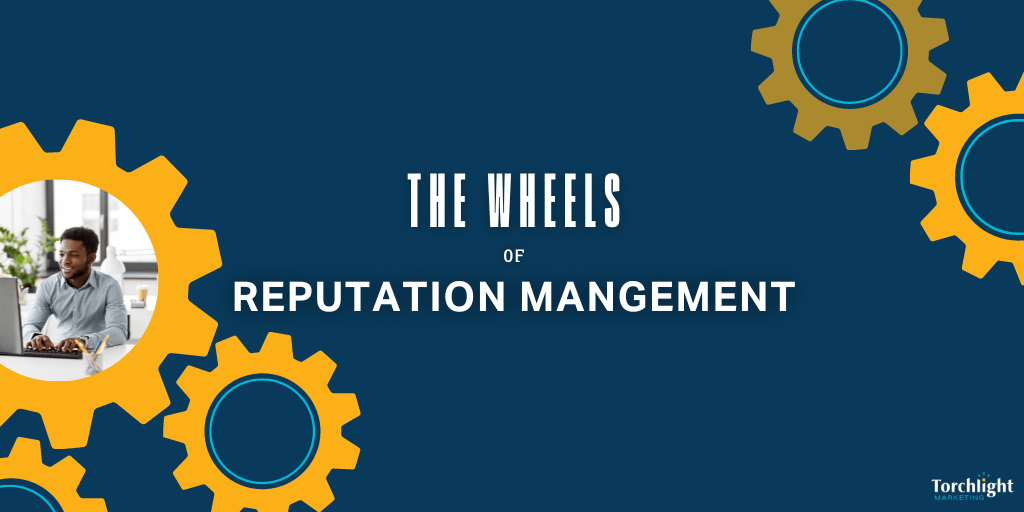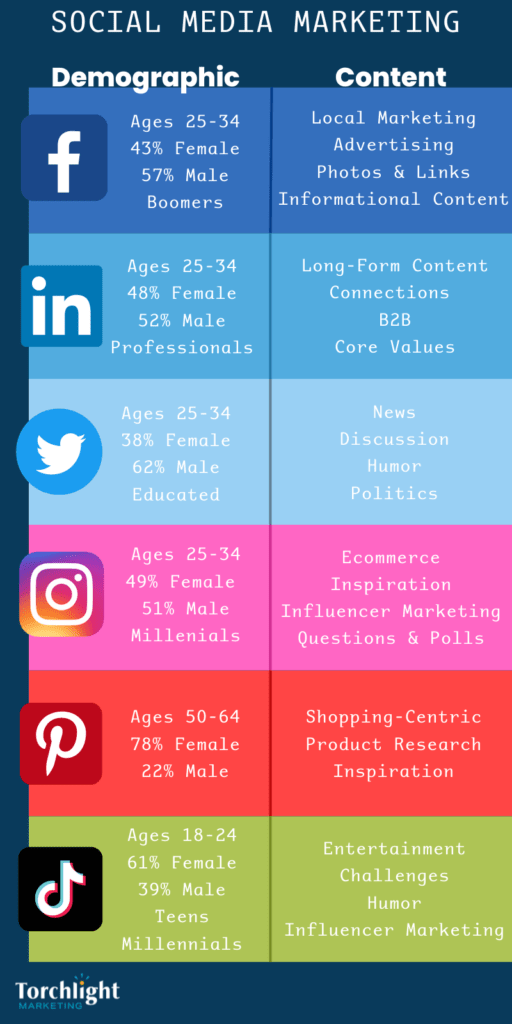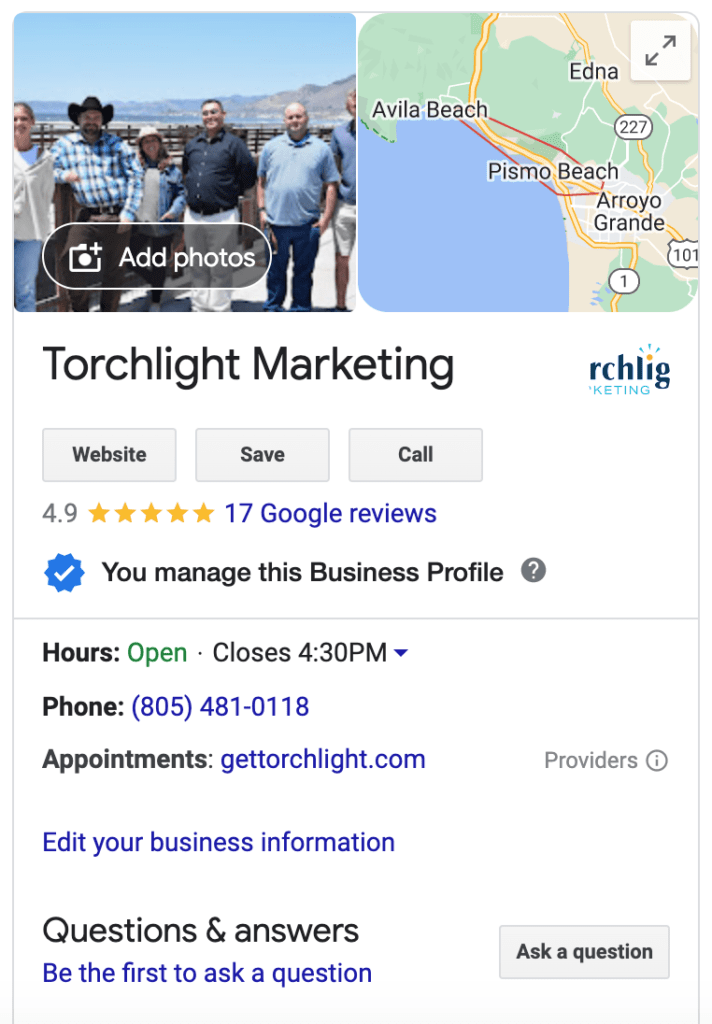Hello, hi, and welcome to the beginning of yet another educational and absorbable blog series, all centered around Reputation Management. Oh, what is Reputation Management you ask? Reputation Management is one of Torchlight Marketing’s core services that goes hand-in-hand with SEO.
We understand that the world of SEO can be intimidating and confusing. Our hope is that with these articles, we can clear the fog between you and the evolving technology of what goes on in the digital marketing world. Whether you are a business owner or a marketer yourself, we guarantee you will find something of use within these blogs. Now, because we are well-rounded, helpful individuals, we have already curated a multi-part series of everything SEO and what we deem as their pillars.
Back to Reputation Management. As we said above, this plays a vital role in conjunction with SEO but also focuses on how potential customers see your business, not just how Google sees it.
The three different “wheels” or pillars of Reputation Management include Listings, Review Sites and Social Media– components that are always turning, and therefore, should always be looked after. Much like the pillars of SEO, all three of these components interact with each other.
Allow me to explain.
Wheel #1: Listings
Think of these three components not side by side, like you might view the SEO pillars, but more like Listings being the all encompassing component, with Review Sites and Social Media branching beneath and interacting with each other.
Listings are what occupy the entire space of Reputation Management– all social media profiles and review sites have a hand in providing their own listing directory on the internet. Beyond social media and review sites, there are plenty of others not nearly as sophisticated, but out on the internet and most likely with inaccurate data about your business.
Think of Listings as pies. Social media might be a pumpkin pie and review sites might be an apple pie. Yes, both apple pie and pumpkin pie use the same ingredients for the crust and spices in their fillings, but each of them are their own distinct pie flavor. While both pumpkin and apple are both pies, not all pies are pumpkin or apple flavored.
Did that help or did I just make you more excited for Thanksgiving?
Being that Listings are a universal component of Reputation Management, they help build your site’s SEO. They include all of the citations across the internet that Google uses to build confidence about your business information: company name, address, website address, phone number, etc. There is an extensive list of different sites you can have your business listing on and it’s crucial your business is not only present on those, but that all of that business information is consistent across the board.
Consistency across all directories is an important SEO play (reminder, it’s something Google pays attention to) and with the right software platform it becomes easy to ensure all of the basic information about your business is accurate and readily available, creating a better customer service experience as well. A platform that we use as part of our services, Market Pulse, allows for fast and easy consistency across many directories. This also provides high quality backlinks to your website (which is also a very important SEO play).
Some of the common directories you should be on include: the YellowPages, 411.com, Manta, Hot Frog, among many others. Part of our Reputation Management services includes listings for your business across more than 60 of the most popular directories.
Wheel #2: Review Sites
Moving onto apple pie, I mean, Review Sites. This is what builds trust with your customers.
Review sites and reviews are one of the most valuable and trusted resources that potential customers can use to determine whether they want to do business with you or not. They help improve not only your social appearance but your authority as a business as a whole – both in the eyes of potential customers and Google.
Both the amount and rating of the reviews are important. You want both quantity and quality, but contrary to what most people think, negative reviews are important as well!
It can be quite a dramatic experience when a business receives a negative review. We usually see three instances. 1) The business messed up and they justifiably fell into a panicked position in order to appease the customer to fix any wrongdoing. 2) The business is dealing with an unreasonable customer and the business owner feels justified in the situation but no matter what, the customer will not be happy. If we let this scenario play out, it usually results in finger-pointing from both sides. 3) A negative review is left but the business owner has no idea who this person is. It appears to be an anonymous and malicious attempt to lower the business’s rating.
Despite all of these scenarios, the best way to handle them is to view a negative review as a great opportunity for you to showcase how your business responds in difficult situations.
If a customer doesn’t have a 4 or 5 star worthy experience with your services, reaching out to them to understand the entire situation enables that customer to see that you care about their experience. They might possibly edit their review, but more importantly you might be able to reevaluate the situation so that they return back to your business.
This is also an equal opportunity for a potential customer who views said negative review. This situation shows the pride you take in your business and the vigilance you have in ensuring that customers truly have a positive experience with your business, even after their experience is technically “over”. Most importantly, when you reason with negative reviews, remember that you are responding out in the public eye with all your future prospective customers watching.
Some of the most important review sites to build both your SEO and your trust are your Google Business Profile (formerly Google My Business), Facebook, Yelp, Trip Advisor, Glassdoor and many others.
Wheel #3: Social Media
Finally we come to our third pillar of Reputation Management, Social Media. This helps your business build familiarity with your customers.
Social Media continues to encompass up-and-coming platforms that have a great impact not only on your SEO but how others view your business. This is a place where you truly get to showcase the personality of your business as well.
Now we’re not saying you need to get up and dance for Tik Tok, but certain industries can gain a lot of traction based on their follower and “like” counts, the hashtags they use and their content engagement. Due to the amount of social media networks available, gearing your efforts depending on your industry is important. Facebook remains one of the most important social media platforms to be a part of, but if you are targeting a younger demographic, Instagram and TikTok can be beneficial for your business as well. If you are in the corporate world, LinkedIn and Twitter are great platforms to connect with potential clients. If you are a retailer or sell home products to clients, Pinterest (as well as Instagram) is the perfect opportunity to showcase your product in an aesthetically pleasing way.
Having yet another platform to showcase your business and its information ties into so many other factors in Reputation Management, with quality backlinks and listings being just two of those.
As mentioned before, having consistent business information on all of these platforms is key to getting the most value possible to your SEO.
Similarities Between Review Sites & Social Media
Now because Review Sites and Social Media both stem from Listings, they have some of the same properties that deserve an honorable mention.
The first of them being Google Business Profile (GBP)– formerly known as Google My Business. Your business’s GBP is the panel that displays when someone searches your business in Google’s search engine, to put it (very) lightly, however, it goes far beyond that. It has also been called the knowledge panel, knowledge graph or Local Panel.
The reason we mention it here, is because it shares some similarities with Social Media networks, where you can upload content so users can see, while also being a platform customers can review your business (Google reviews). This is one of the most important similarities between Review Sites and Social Media as it obtains both the characteristics of building trust and familiarity with your customers. Additionally, it is one of the most important networks to look after, afterall Google will be biased to its own networks first over Facebook or Yelp.
The next similarity pertains to ads. And while we have an entire different set of blogs dedicated to PPC advertising, both Review Sites and Social Media leverage ads in their own ways. Both Review Sites and Social Media allow you to “boost” or advertise a certain review or post in order to get more eyes on that piece of content. Boosting is another form of paid advertising and basically training wheels to introduce their advertising platform.
Takeaway
When it comes to Digital Marketing, SEO is definitely the biggest and baddest buzz word that people think of. Yet there are so many other factors that are just as important. As we’ve learned today, many of those play a part in your SEO as well.
With this brief overview, our goal was to shed some light on what Reputation Management is, what its factors are and why they’re important. Next up in this blog series, we’ll be diving a bit deeper into Listings, so be on the lookout for that blog!
If you’re hungry for more, be sure to check out our deep dives in our SEO series, where we examine the depths of website structure, content, backlinks and technology!
To learn even more about our services contact us on our website or give us a call at (805) 481-0118.




